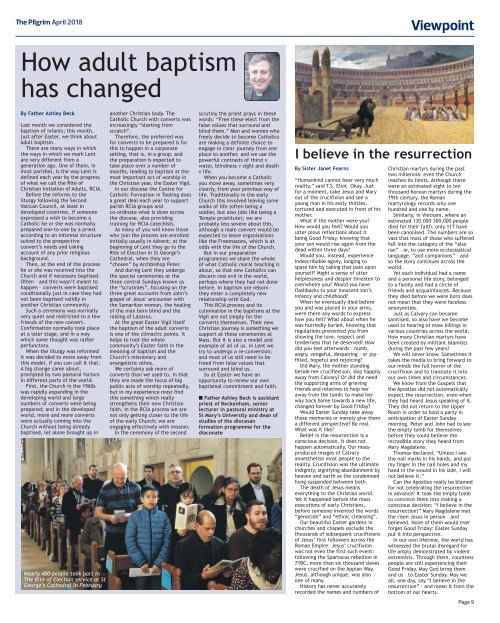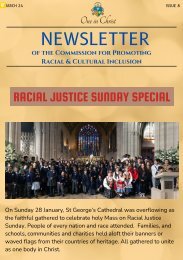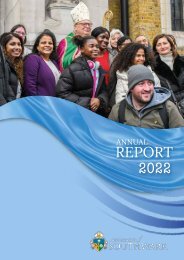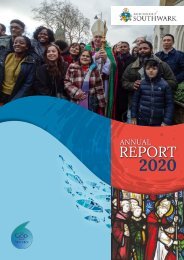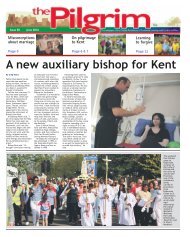Issue 70 - The Pilgrim - April 2018 - The newspaper of the Archdiocese of Southwark
The April 2018 issue of "The Pilgrim", the newspaper of the Archdiocese of Southwark
The April 2018 issue of "The Pilgrim", the newspaper of the Archdiocese of Southwark
You also want an ePaper? Increase the reach of your titles
YUMPU automatically turns print PDFs into web optimized ePapers that Google loves.
<strong>The</strong> <strong>Pilgrim</strong> <strong>April</strong> <strong>2018</strong><br />
Viewpoint<br />
How adult baptism<br />
has changed<br />
By Fa<strong>the</strong>r Ashley Beck<br />
Last month we considered <strong>the</strong><br />
baptism <strong>of</strong> infants; this month,<br />
just after Easter, we think about<br />
adult baptism.<br />
<strong>The</strong>re are many ways in which<br />
<strong>the</strong> ways in which we mark Lent<br />
are very different from a<br />
generation ago. One <strong>of</strong> <strong>the</strong>m, in<br />
most parishes, is <strong>the</strong> way Lent is<br />
defined each year by <strong>the</strong> progress<br />
<strong>of</strong> what we call <strong>the</strong> Rite <strong>of</strong><br />
Christian Initiation <strong>of</strong> Adults, RCIA.<br />
Before <strong>the</strong> reforms to <strong>the</strong><br />
liturgy following <strong>the</strong> Second<br />
Vatican Council, at least in<br />
developed countries, if someone<br />
expressed a wish to become a<br />
Catholic he or she was normally<br />
prepared one-to-one by a priest<br />
according to an informal structure<br />
suited to <strong>the</strong> prospective<br />
convert’s needs and taking<br />
account <strong>of</strong> any prior religious<br />
background.<br />
<strong>The</strong>n, at <strong>the</strong> end <strong>of</strong> <strong>the</strong> process<br />
he or she was received into <strong>the</strong><br />
Church and if necessary baptised.<br />
Often – and this wasn’t meant to<br />
happen – converts were baptised<br />
conditionally just in case <strong>the</strong>y had<br />
not been baptised validly in<br />
ano<strong>the</strong>r Christian community.<br />
Such a ceremony was normally<br />
very quiet and restricted to a few<br />
friends <strong>of</strong> <strong>the</strong> new convert.<br />
Confirmation normally took place<br />
at a later stage, and in a way<br />
which some thought was ra<strong>the</strong>r<br />
perfunctory.<br />
When <strong>the</strong> liturgy was reformed<br />
it was decided to move away from<br />
this model, if you can call it that.<br />
A big change came about,<br />
prompted by two pastoral factors<br />
in different parts <strong>of</strong> <strong>the</strong> world.<br />
First, <strong>the</strong> Church in <strong>the</strong> 1960s<br />
was rapidly expanding in <strong>the</strong><br />
developing world and large<br />
numbers <strong>of</strong> converts were being<br />
prepared; and in <strong>the</strong> developed<br />
world, more and more converts<br />
were actually coming into <strong>the</strong><br />
Church without being already<br />
baptised, let alone brought up in<br />
Nearly 400 people took part in<br />
<strong>The</strong> Rite <strong>of</strong> Election service at St<br />
George’s Ca<strong>the</strong>dral in February.<br />
ano<strong>the</strong>r Christian body. <strong>The</strong><br />
Catholic Church with converts was<br />
increasingly “starting from<br />
scratch”.<br />
<strong>The</strong>refore, <strong>the</strong> preferred way<br />
for converts to be prepared is for<br />
this to happen in a corporate<br />
setting, that is, in a group; and<br />
<strong>the</strong> preparation is expected to<br />
take place over a number <strong>of</strong><br />
months, leading to baptism at <strong>the</strong><br />
most important act <strong>of</strong> worship in<br />
<strong>the</strong> Christian year, <strong>the</strong> Easter Vigil.<br />
In our diocese <strong>the</strong> Centre for<br />
Catholic Formation in Tooting does<br />
a great deal each year to support<br />
parish RCIA groups and<br />
co-ordinate what is done across<br />
<strong>the</strong> diocese, also providing<br />
training for RCIA catechists.<br />
As many <strong>of</strong> you will know those<br />
who join <strong>the</strong> process are enrolled<br />
initially usually in Advent; at <strong>the</strong><br />
beginning <strong>of</strong> Lent <strong>the</strong>y go to <strong>the</strong><br />
Rite <strong>of</strong> Election in St George’s<br />
Ca<strong>the</strong>dral, when <strong>the</strong>y are<br />
“chosen” by Archbishop Peter.<br />
And during Lent <strong>the</strong>y undergo<br />
<strong>the</strong> special ceremonies at <strong>the</strong><br />
three central Sundays known as<br />
<strong>the</strong> “scrutinies”, focusing on <strong>the</strong><br />
three great accounts from John’s<br />
gospel <strong>of</strong> Jesus’ encounter with<br />
<strong>the</strong> Samaritan woman, <strong>the</strong> healing<br />
<strong>of</strong> <strong>the</strong> man born blind and <strong>the</strong><br />
raising <strong>of</strong> Lazarus.<br />
At <strong>the</strong> great Easter Vigil itself<br />
<strong>the</strong> baptism <strong>of</strong> <strong>the</strong> adult converts<br />
is one <strong>of</strong> <strong>the</strong> climactic points. It<br />
helps to root <strong>the</strong> whole<br />
community’s Easter faith in <strong>the</strong><br />
meaning <strong>of</strong> baptism and <strong>the</strong><br />
Church’s missionary and<br />
evangelistic ethos.<br />
We certainly ask more <strong>of</strong><br />
converts than we used to, in that<br />
<strong>the</strong>y are made <strong>the</strong> focus <strong>of</strong> big<br />
public acts <strong>of</strong> worship repeatedly,<br />
but in my experience most find<br />
this something which really<br />
streng<strong>the</strong>ns <strong>the</strong>ir new Christian<br />
faith. In <strong>the</strong> RCIA process we are<br />
not only getting closer to <strong>the</strong> life<br />
<strong>of</strong> <strong>the</strong> early Church; we are<br />
engaging effectively with mission.<br />
In <strong>the</strong> ceremony <strong>of</strong> <strong>the</strong> second<br />
scrutiny <strong>the</strong> priest prays in <strong>the</strong>se<br />
words: “Free <strong>the</strong>se elect from <strong>the</strong><br />
false values that surround and<br />
blind <strong>the</strong>m.” Men and women who<br />
freely decide to become Catholics<br />
are making a definite choice to<br />
engage in clear journey from one<br />
place to ano<strong>the</strong>r, and we use <strong>the</strong><br />
powerful contrasts <strong>of</strong> thirst v<br />
water, blindness v sight and death<br />
v life.<br />
When you become a Catholic<br />
you move away, sometimes very<br />
clearly, from your previous way <strong>of</strong><br />
life. Traditionally in <strong>the</strong> early<br />
Church this involved leaving some<br />
walks <strong>of</strong> life (<strong>of</strong>ten being a<br />
soldier, but also jobs like being a<br />
Temple prostitute); we are<br />
probably less severe about this,<br />
although a male convert would be<br />
expected to leave organisations<br />
like <strong>the</strong> Freemasons, which is at<br />
odds with <strong>the</strong> life <strong>of</strong> <strong>the</strong> Church.<br />
But in our preparation<br />
programmes we share <strong>the</strong> whole<br />
<strong>of</strong> what Catholic moral teaching is<br />
about, so that new Catholics can<br />
discern real evil in <strong>the</strong> world,<br />
perhaps where <strong>the</strong>y had not done<br />
before. In baptism are reborn –<br />
<strong>the</strong>y enter a completely new<br />
relationship with God.<br />
This RCIA process and its<br />
culmination in <strong>the</strong> baptisms at <strong>the</strong><br />
Vigil are not simply for <strong>the</strong><br />
converts <strong>the</strong>mselves. <strong>The</strong>ir new<br />
Christian journey is something we<br />
support at <strong>the</strong>se ceremonies at<br />
Mass. But it is also a model and<br />
example <strong>of</strong> all <strong>of</strong> us. In Lent we<br />
try to undergo a re-conversion;<br />
and most <strong>of</strong> us still need to be<br />
freed from false values that<br />
surround and blind us.<br />
So at Easter we have an<br />
opportunity to renew our own<br />
baptismal commitment and faith.<br />
n Fa<strong>the</strong>r Ashley Beck is assistant<br />
priest <strong>of</strong> Beckenham, senior<br />
lecturer in pastoral ministry at<br />
St Mary’s University and dean <strong>of</strong><br />
studies <strong>of</strong> <strong>the</strong> diocesan<br />
formation programme for <strong>the</strong><br />
diaconate<br />
I believe in <strong>the</strong> resurrection<br />
By Sister Janet Fearns<br />
“Humankind cannot bear very much<br />
reality,” said T.S. Eliot. Okay. Just<br />
for a moment, take Jesus and Mary<br />
out <strong>of</strong> <strong>the</strong> crucifixion and see a<br />
young man in his early thirties,<br />
tortured and executed in front <strong>of</strong> his<br />
mo<strong>the</strong>r.<br />
What if <strong>the</strong> mo<strong>the</strong>r were you?<br />
How would you feel? Would you<br />
utter pious reflections about it<br />
being Good Friday, knowing that<br />
your son would rise again from <strong>the</strong><br />
dead within three days?<br />
Would you, instead, experience<br />
indescribable agony, longing to<br />
spare him by taking that pain upon<br />
yourself? Might a sense <strong>of</strong> utter<br />
helplessness and despair threaten to<br />
overwhelm you? Would you have<br />
flashbacks to your innocent son’s<br />
infancy and childhood?<br />
When he eventually died before<br />
you and was placed in your arms,<br />
were <strong>the</strong>re any words to express<br />
how you felt? What about when he<br />
was hurriedly buried, knowing that<br />
regulations prevented you from<br />
showing <strong>the</strong> love, respect and<br />
tenderness that he deserved? How<br />
did you feel afterwards – numb,<br />
angry, vengeful, despairing – or joyfilled,<br />
hopeful and rejoicing?<br />
Did Mary, <strong>the</strong> mo<strong>the</strong>r standing<br />
beside her crucified son, skip happily<br />
away from Calvary? Or did she need<br />
<strong>the</strong> supporting arms <strong>of</strong> grieving<br />
friends and relatives to help her<br />
away from <strong>the</strong> tomb; to make her<br />
way back home towards a new life,<br />
changed forever by Good Friday?<br />
Would Easter Sunday take away<br />
those memories or merely give <strong>the</strong>m<br />
a different perspective? Be real.<br />
What was it like?<br />
Belief in <strong>the</strong> resurrection is a<br />
conscious decision. It does not<br />
happen automatically. Our massproduced<br />
images <strong>of</strong> Calvary<br />
anaes<strong>the</strong>tise most people to <strong>the</strong><br />
reality. Crucifixion was <strong>the</strong> ultimate<br />
indignity, signifying abandonment by<br />
heaven and earth as <strong>the</strong> condemned<br />
hung suspended between both.<br />
<strong>The</strong> death <strong>of</strong> Jesus means<br />
everything to <strong>the</strong> Christian world.<br />
Yet it happened before <strong>the</strong> mass<br />
executions <strong>of</strong> early Christians,<br />
before someone invented <strong>the</strong> words<br />
“genocide” and “ethnic cleansing”.<br />
Our beautiful Easter gardens in<br />
churches and chapels exclude <strong>the</strong><br />
thousands <strong>of</strong> subsequent crucifixions<br />
<strong>of</strong> Jesus’ first followers across <strong>the</strong><br />
Roman Empire. Jesus’ crucifixion<br />
was not even <strong>the</strong> first such event:<br />
following <strong>the</strong> Spartacus rebellion in<br />
71BC, more than six thousand slaves<br />
were crucified on <strong>the</strong> Appian Way.<br />
Jesus, although unique, was also<br />
one <strong>of</strong> many.<br />
History has never accurately<br />
recorded <strong>the</strong> names and numbers <strong>of</strong><br />
Christian martyrs during <strong>the</strong> past<br />
two millennia: even <strong>the</strong> Church<br />
reaches its limits. Although <strong>the</strong>re<br />
were an estimated eight to ten<br />
thousand Korean martyrs during <strong>the</strong><br />
19th century, <strong>the</strong> Roman<br />
martyrology records only one<br />
hundred and one by name.<br />
Similarly, in Vietnam, where an<br />
estimated 130,000-300,000 people<br />
died for <strong>the</strong>ir faith, only 117 have<br />
been canonised. <strong>The</strong> numbers are so<br />
vast that most <strong>of</strong> those who suffered<br />
fall into <strong>the</strong> category <strong>of</strong> <strong>the</strong> “also<br />
ran” – or, to use more ecclesiastical<br />
language, “and companions” - and<br />
so <strong>the</strong> story continues across <strong>the</strong><br />
world.<br />
Yet each individual had a name<br />
and a personal life story, belonged<br />
to a family and had a circle <strong>of</strong><br />
friends and acquaintances. Because<br />
<strong>the</strong>y died before we were born does<br />
not mean that <strong>the</strong>y were faceless<br />
anonymities.<br />
Just as Calvary can become<br />
sanitised, so also have we become<br />
used to hearing <strong>of</strong> mass killings in<br />
various countries across <strong>the</strong> world.<br />
How many Christian martyrs have<br />
been created by militant Islamists<br />
during <strong>the</strong> past few years?<br />
We will never know. Sometimes it<br />
takes <strong>the</strong> media to bring forward to<br />
our minds <strong>the</strong> full horror <strong>of</strong> <strong>the</strong><br />
crucifixion and to translate it into<br />
our own times and circumstances.<br />
We know from <strong>the</strong> Gospels that<br />
<strong>the</strong> Apostles did not automatically<br />
expect <strong>the</strong> resurrection, even when<br />
<strong>the</strong>y had heard Jesus speaking <strong>of</strong> it.<br />
<strong>The</strong>y did not return to <strong>the</strong> Upper<br />
Room in order to hold a party in<br />
anticipation <strong>of</strong> Easter Sunday<br />
morning. Peter and John had to see<br />
<strong>the</strong> empty tomb for <strong>the</strong>mselves<br />
before <strong>the</strong>y could believe <strong>the</strong><br />
incredible story <strong>the</strong>y heard from<br />
Mary Magdalene.<br />
Thomas declared, “Unless I see<br />
<strong>the</strong> nail marks in his hands, and put<br />
my finger in <strong>the</strong> nail holes and my<br />
hand in <strong>the</strong> wound in his side, I will<br />
not believe it.”<br />
Can <strong>the</strong> Apostles really be blamed<br />
for not celebrating <strong>the</strong> resurrection<br />
in advance? It took <strong>the</strong> empty tomb<br />
to convince <strong>the</strong>m into making a<br />
conscious decision: “I believe in <strong>the</strong><br />
resurrection!” Mary Magdalene met<br />
<strong>the</strong> risen Jesus in person – and<br />
believed. None <strong>of</strong> <strong>the</strong>m would ever<br />
forget Good Friday: Easter Sunday<br />
put it into perspective.<br />
In our own lifetime, <strong>the</strong> world has<br />
witnessed <strong>the</strong> brutal disregard for<br />
life amply demonstrated by violent<br />
extremists. Through <strong>the</strong>m, countless<br />
people are still experiencing <strong>the</strong>ir<br />
Good Friday. May God bring <strong>the</strong>m –<br />
and us – to Easter Sunday. May we<br />
all, one day, say “I believe in <strong>the</strong><br />
resurrection” – and mean it from <strong>the</strong><br />
bottom <strong>of</strong> our hearts.<br />
Page 9


